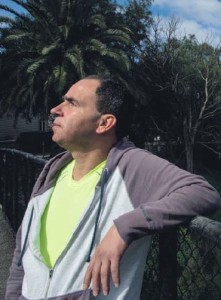A first-hand account of Syrians’ plight
The Syrian people have been doing it tough since long before the rise of ISIS and the current round of deadly and vicious conflict, according to refugee Michael Aboujundi.
 Mr Aboujundi came to Australia by boat from Indonesia more than ten years ago fleeing the brutal Assad regime which he says murdered two of his brothers. And, since then, not much has changed for most ordinary Syrians.
Mr Aboujundi came to Australia by boat from Indonesia more than ten years ago fleeing the brutal Assad regime which he says murdered two of his brothers. And, since then, not much has changed for most ordinary Syrians.
“It was hard for everyone even back then. The government was brutal and people just disappeared,” Mr Aboujundi said.
“I took a stance on this and I was targeted so I had to leave. I could not accept the regime and the lack of any freedom or free opinion of any kind,” he said.
“As a result I was targeted and became wanted by the security forces because of my political activities and beliefs – and these were peaceful activities, basically just speaking out,” he said.
Mr Aboujundi says things have gotten progressively worse in Syria – including for family members still there – with the revolution against the Assad regime and rise of ISIS which stemmed from that.
“My mother and four brothers are still there and I worry about them,” he said.
Mr Aboujundi said one of his brothers was murdered by the Assad regime in a massacre that saw 89 mostly non-combatants killed.
“My brother was living in an area that became a battlefield between the government and revolutionary forces in 2012. He went to his shop to get food for his wife and five kids and he was rounded up and killed with 88 others,” he said.
“My brother was not involved in the conflict like most people who are the victims of this war. He was just trying to look after his family but he died and his family’s home was destroyed.
“I have another brother who is missing. We haven’t heard from him for two years and we have no idea where he is. Obviously we fear the worst,” Mr Aboujundi said.
He said he recently visited two of his sisters who were also forced to flee – one to Egypt and another to Turkey.
“They are displaced persons and they are just surviving – they get no support from government or from the UN,” Mr Aboujundi said.
He says Syrians have endured decades of oppression and violence first at the hands of their own government and now also at the hands of ISIS.
“The Syrian people have been doing it tough for a long time,” he said.
“When the revolution started it was just peaceful demonstrations but when the government cracked down and things got violent it made room for ISIS to come in and we’ve all seen what they have done,” Mr Aboujundi said.
“The international community just looked on for two years… so what do you expect.
“The situation in Syria is quite bizarre. The international community should go in and sort things out but of course it is not that simple.
“The Assad regime has been a good friend of the Russians for a long time and is being supplied weapons. I believe there are even Russian troops on the ground advising Assad,” he said.
In the meantime, Mr Aboujundi has welcomed the Australian Government’s move to accept 12,000 extra refugees from Syria.
“The people coming here will feel safe, there’s no need to panic or worry about what might happen in the next minute or hour with bombing and fighting everywhere,” he said.
“It’s a step in the right direction,” said Mr Aboujundi, who is a volunteer worker at the Victorian Public Tenants Association.
“But the talk of accepting ethnic minorities is troubling – it is as if no one else in Syria is at risk. The truth is everyone is at risk.
“The truth is that no matter which group you come from, you are a target for one side or the other,” he said.
Mr Aboujundi said that in a recent phone call to his mother, she summed up the situation in Syria.
“She said to me: ‘The sky is on fire, the ground is burning, the streets smell of blood and death is hovering over all of us’.”
“It is heartbreaking to hear that from my mother, it’s just terrible,” he said.
Laurie Nowell
AMES Australia Senior Journalist












